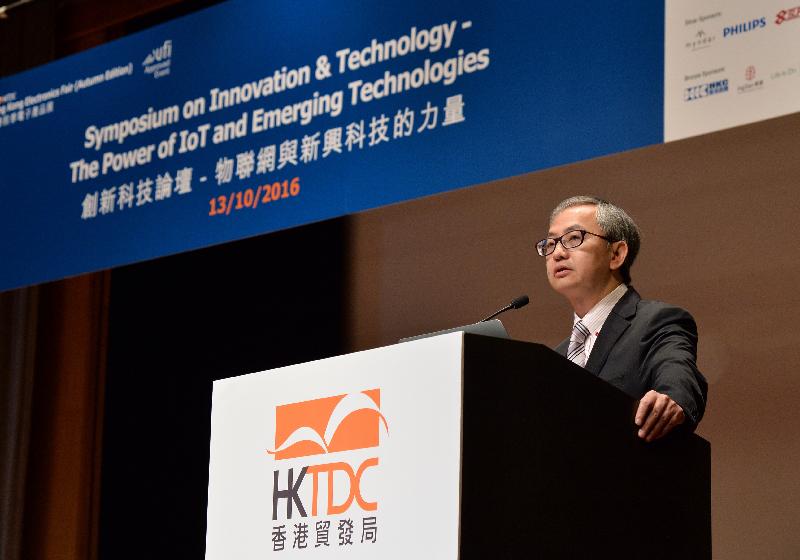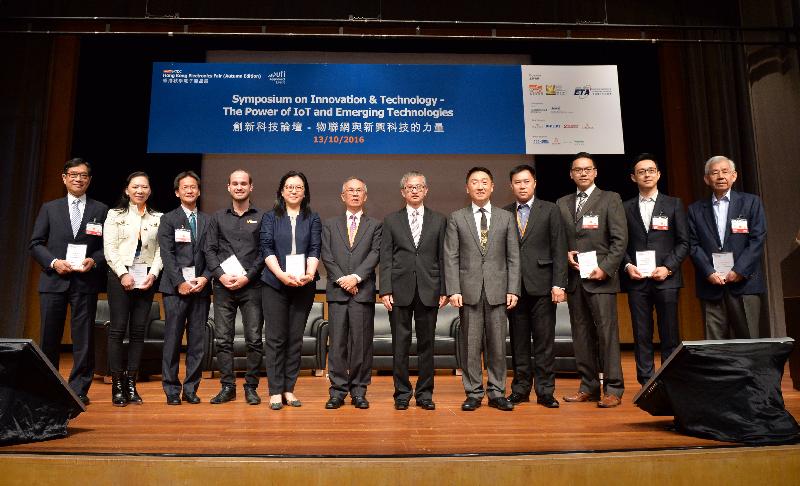Speech by Acting S for IT at Symposium on Innovation & Technology - The Power of IoT and Emerging Technologies (English only) (with photos)
******************************************************************************************
Benjamin (Acting Executive Director of the HKTDC, Mr Benjamin Chau), Victor (Chairman of the HKETA, Mr Victor Ng), distinguished guests, ladies and gentlemen,
Good morning. It's my great pleasure to be here with all of you at this symposium today. It is actually an excellent opportunity for all I&T experts to share their insights on the future trends of the IoT (Internet of Things) and emerging technologies.
The IoT connects devices that communicate and interact with each other and with other systems for the convenience of our life. It fuses the physical devices and the digital worlds to develop new capabilities and services, which in turn drives innovative solutions and new business opportunities. Cisco has estimated that the economic benefits of IoT for businesses worldwide will be US$14.4 trillion by 2022. Furthermore, many industry reports show that the adoption of IoT in production can not only reduce operational costs and increase productivity, but also enhance customer experience. According to Oracle's findings, half of the IoT activities now focus on manufacturing, transformation, smart cities as well as consumer marketing. Wearable devices, connected vehicles and connected homes are among the fastest developing IoT applications. The IoT is proliferating in all sectors, creating opportunities for both businesses and public sector.
Hong Kong is an early adopter of the IoT. Over the years, our Government has been adopting sensors and related technologies in various fields to improve services to the public. For example, we have deployed sensors at busy roads to collect real-time transport data for traffic management, in manholes of drains to detect water levels for drainage management, and inside slopes to monitor the condition for landslide prevention. IoT applications have also been extended to other domains, such as supply chain and warehouse management, luggage handling at Hong Kong International Airport, trade and logistics, and so forth.
Riding on our experiences in adopting the IoT, the Government is committed to developing Hong Kong into a smart city. Our objectives are to address urban challenges, to enhance city management and improve the quality of living, and to improve the sustainability, efficiency and safety of our city. We also aim at enhancing city attractiveness to global business and talents and inspiring city innovation and sustainable economic development. We have just commissioned a consultancy study to map out a smart city blueprint and long-term development plans up to 2030. Building blocks of the blueprint will comprise Policy Objectives and Strategy, Development Plans, Governance Arrangements, Digital Infrastructure, Legal Framework, and Public-Private Collaboration.
To implement the smart city initiative, we need to have the necessary communications and network infrastructure in place to connect sensors and collect data. The Government has been working to enhance the city's connectivity through Wi-Fi. At present, there are over 17 000 Wi-Fi.HK hotspots offering free Wi-Fi services. The Government is implementing the Wi-Fi Connected City programme to expand the coverage of Wi-Fi.HK progressively to 34 000 hotspots within three years. Venues to be covered include public rental housing estates, public hospitals, markets, parks, sitting-out areas, promenades, tourist spots, public transport interchanges and land boundary control points.
We will also gradually double the speed of Wi-Fi connections at government venues and enhance their security. We welcome the private sector to actively participate in the development of Wi-Fi services and infrastructure in Hong Kong by introducing innovative ideas and business opportunities riding on the Wi-Fi Connected City programme.
Another key initiative closely related to IoT development is big data applications. To promote the opening up of data, the Government launched the revamped Public Sector Information (PSI) portal (data.gov.hk) in 2015 to make available PSI in digital format for re-use for commercial or non-commercial purpose free of charge. At present there are over 6 000 data sets in 18 broad categories, covering various policy areas including environment, finance, weather and transportation. We will continue to release more PSI in machine-readable formats for reuse by the community and Application Programming Interfaces (APIs) to provide convenient access to the PSIs by application developers to induce more innovation.
Over the years, the Government has devised various measures to support the development and application of innovative technologies including IoT and other emerging technologies. We offer financial support to the industry, academia and research sector to develop and commercialise their R&D results, nurture talent and strengthen collaboration with the Mainland and other countries.
In this year's Policy Address and Budget, the Government committed to investing $18 billion to promote the development of innovation and technology, including the injection of $4 billion to finance the expansion of the Science Park, home to a great number of tech companies.
Cyberport, another government-owned facility that implements incubation programmes for start-ups, has just launched the Cyberport Macro Fund, on top of the already successful Micro Fund programme. To step up its support for start-ups, Cyberport will also double the quota of its incubation programme from 50 to 100, establish new clusters for FinTech and e-commerce, and increase its co-working space by 50 per cent within 2016.
The Hong Kong technology start-up landscape has seen remarkable growth in recent years. There are currently more than 1 600 start-ups and over 40 incubators, accelerators and co-working spaces in Hong Kong. According to a global consultancy study, Hong Kong is ranked number five in terms of fastest growing start-up ecosystems and among the world's top 25 start-up hubs.
To upkeep the start-up momentum, we are setting up a $2 billion Innovation and Technology Venture Fund to partner with private venture-capital funds to invest in local technology start-ups.
Complementing our work on this front are a dozen overseas institutions, innovation labs, incubators and accelerator programmes that have found their way to locate in Hong Kong. For example, in 2015, the Hong Kong-based Brinc launched its accelerator programme, Brinc IoT Hub, to support startups and help Hong Kong develop into a world-leading IoT hub. Infiniti, another accelerator setting foot in Hong Kong, launched the Infiniti Accelerator 2.0 several months ago after witnessing the success of its Accelerator 1.0 programme. The Wearable IoT World Labs from San Francisco has also launched their innovation labs in Hong Kong earlier this year.
As Abraham Lincoln said, "I will prepare and some day my chance will come." With the commitment of the Government and collaboration with the industry and academia, Hong Kong offers unique opportunities for the development of innovative ideas and applications by means of IoT and emerging technologies. Let us grasp the opportunities and ride on the new waves of innovation and technology developments.
I would like to thank the Hong Kong Trade Development Council and the Hong Kong Electronics & Technologies Association for organising this event today. I am sure that all of us are looking forward to the inspirational sharing in today's conference. I wish it a great success. Thank you very much.
Ends/Thursday, October 13, 2016
Issued at HKT 13:17
Issued at HKT 13:17
NNNN




